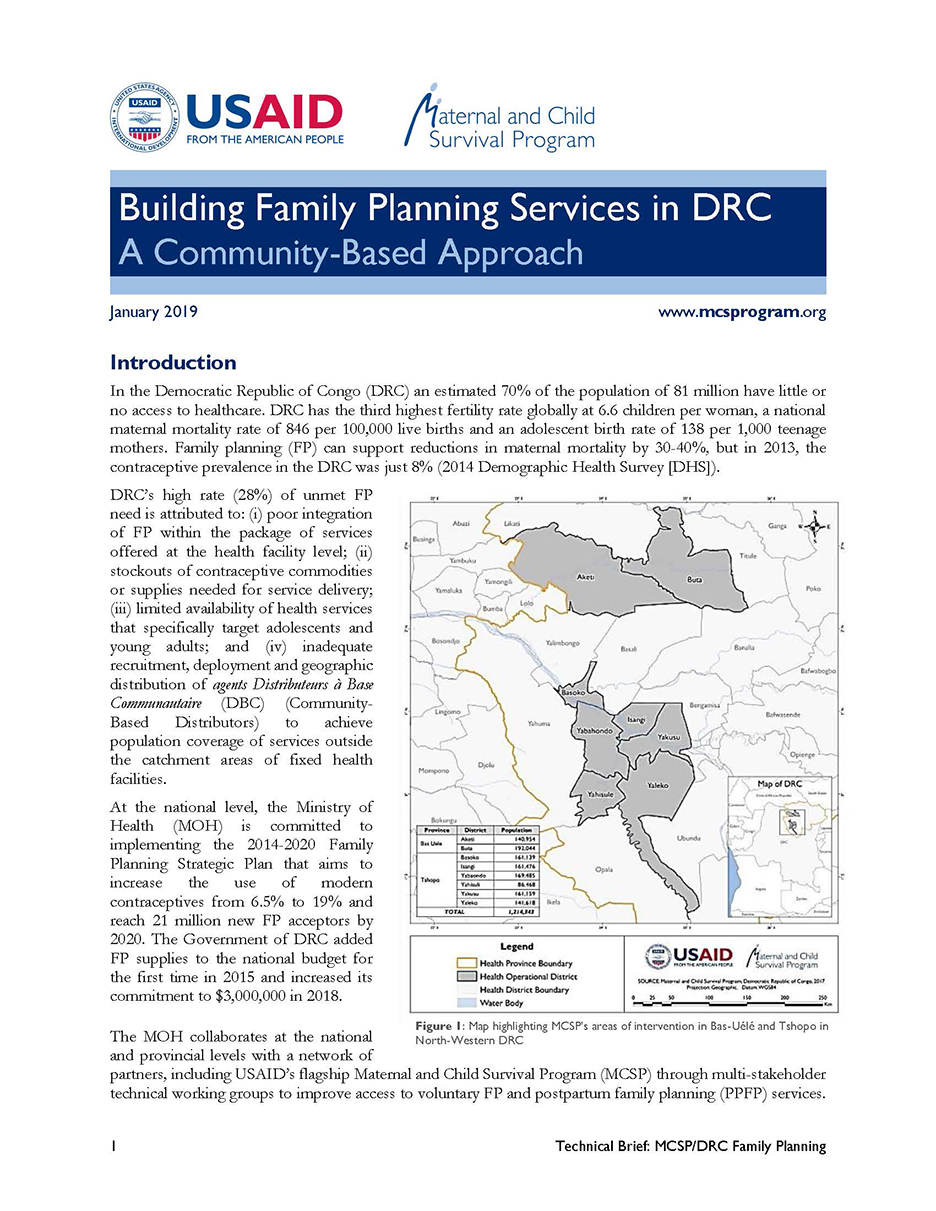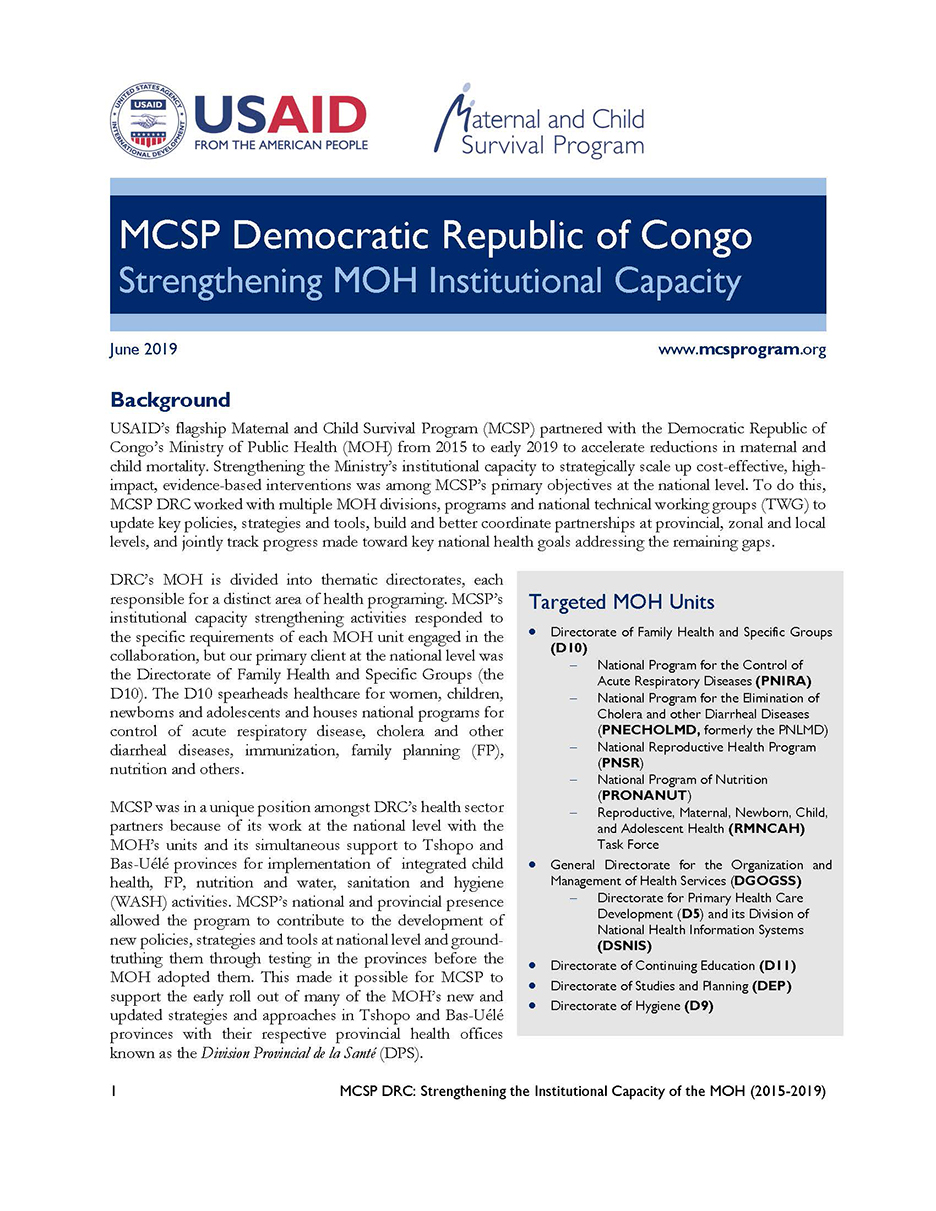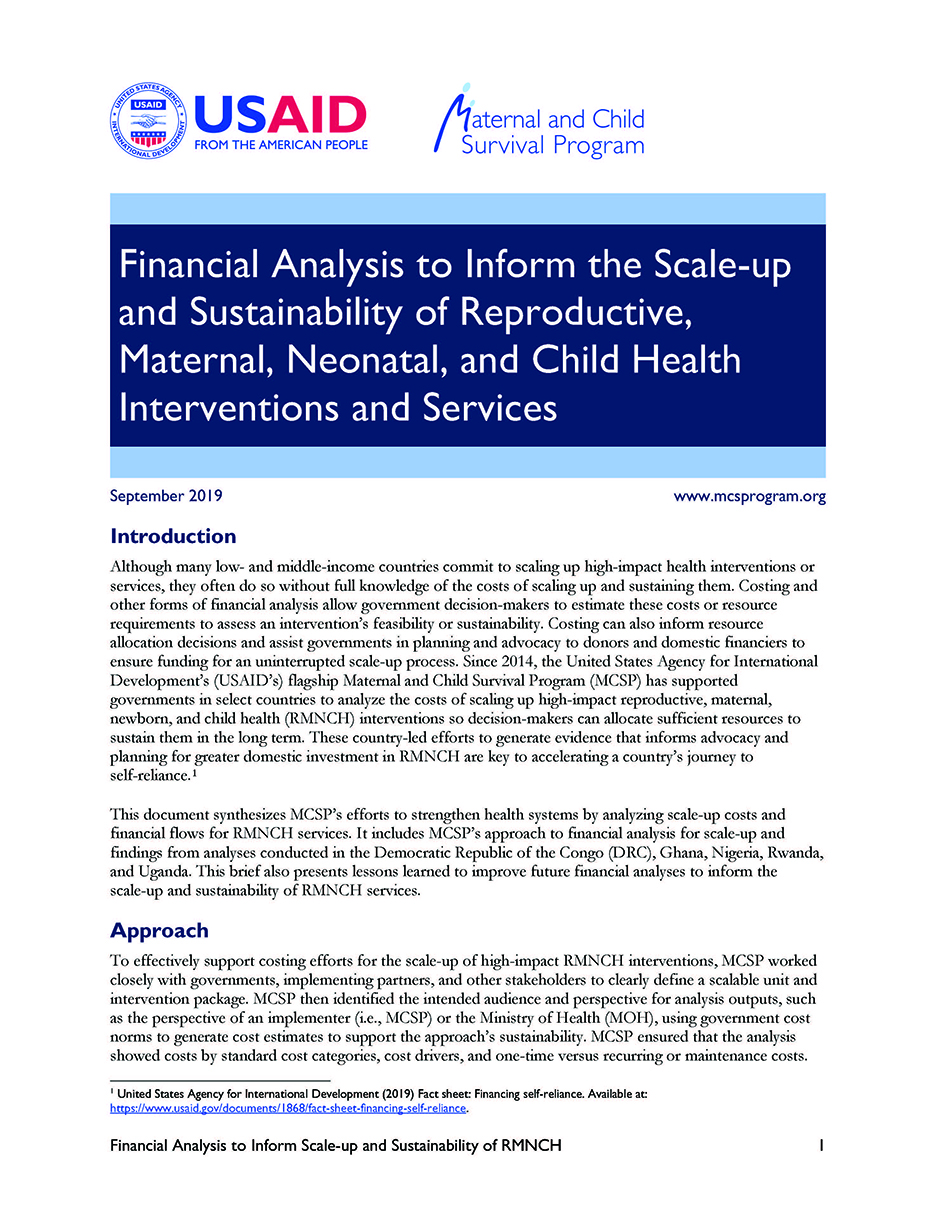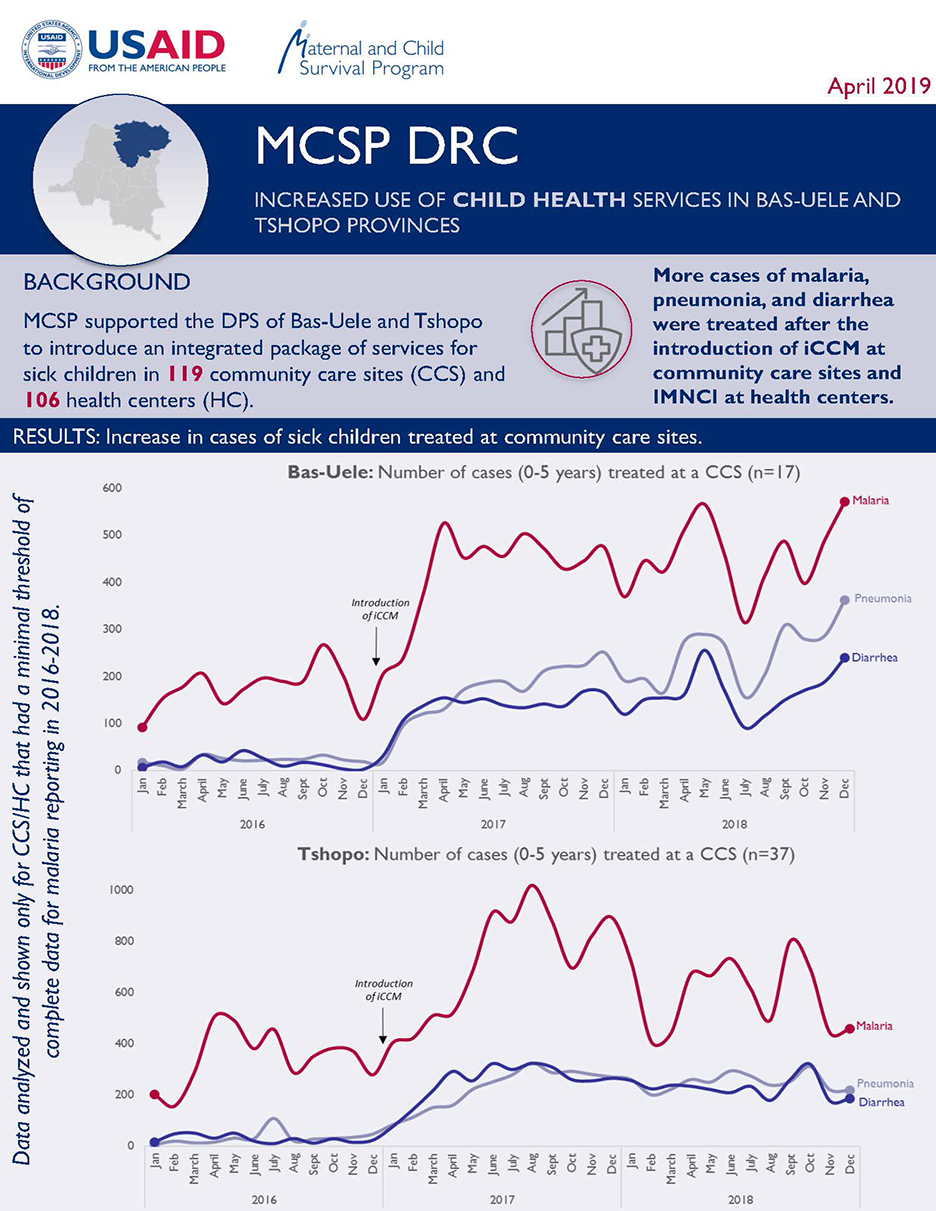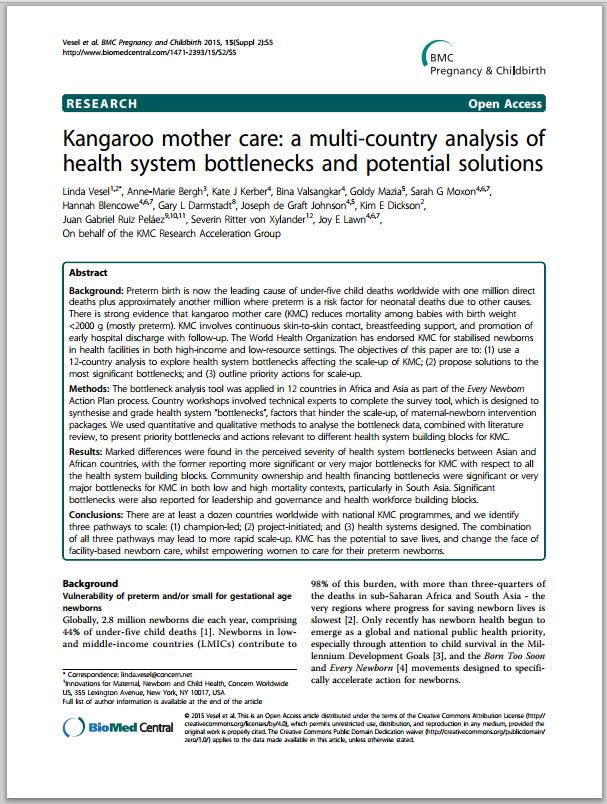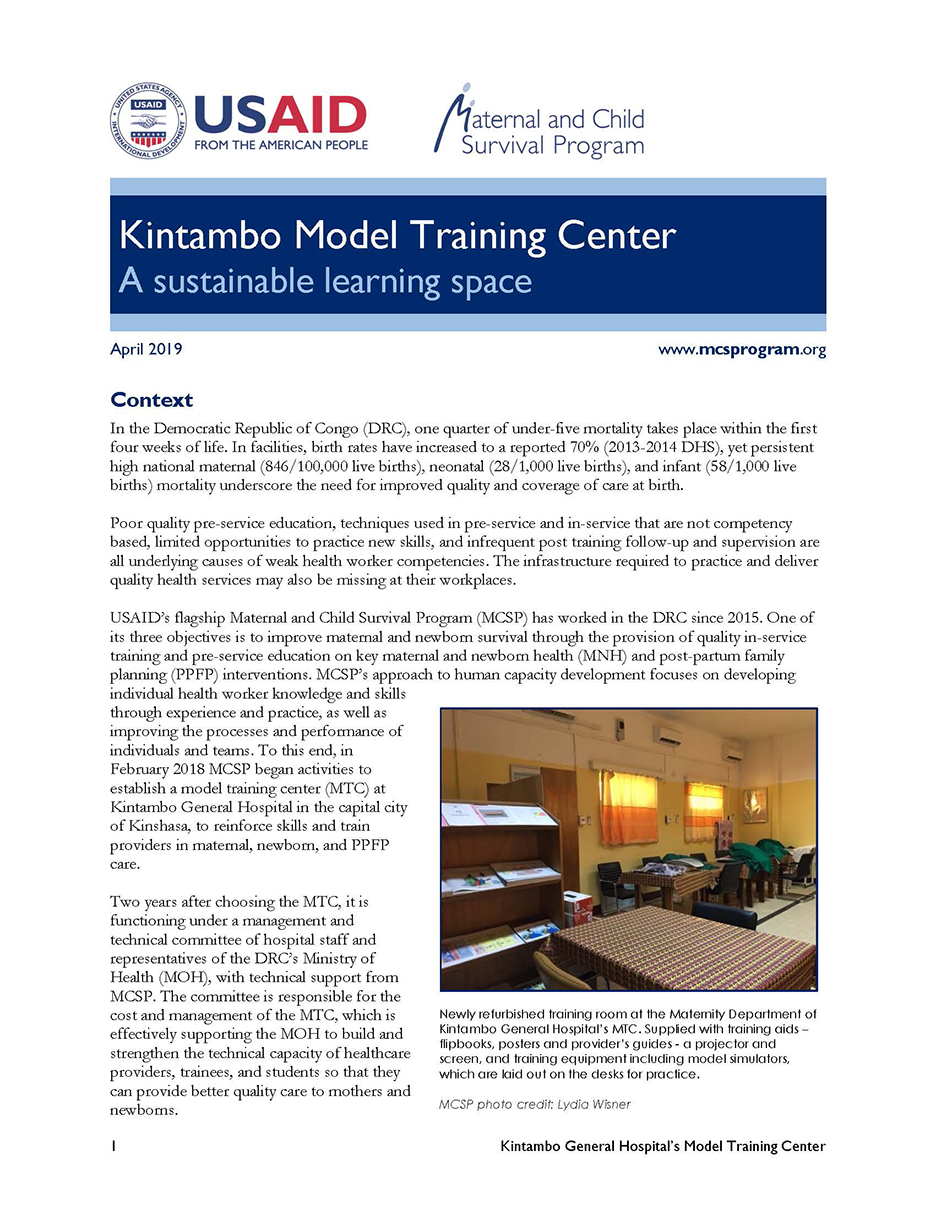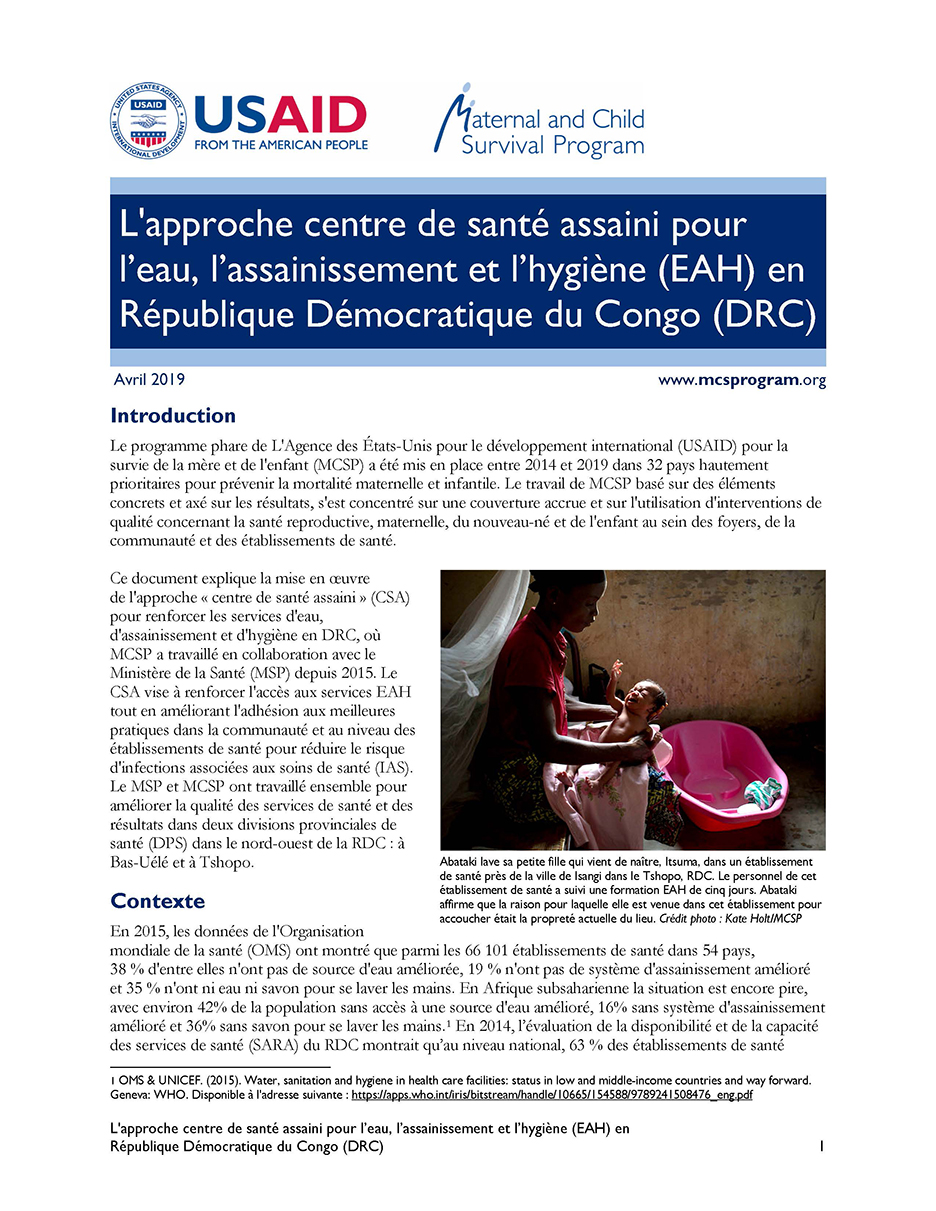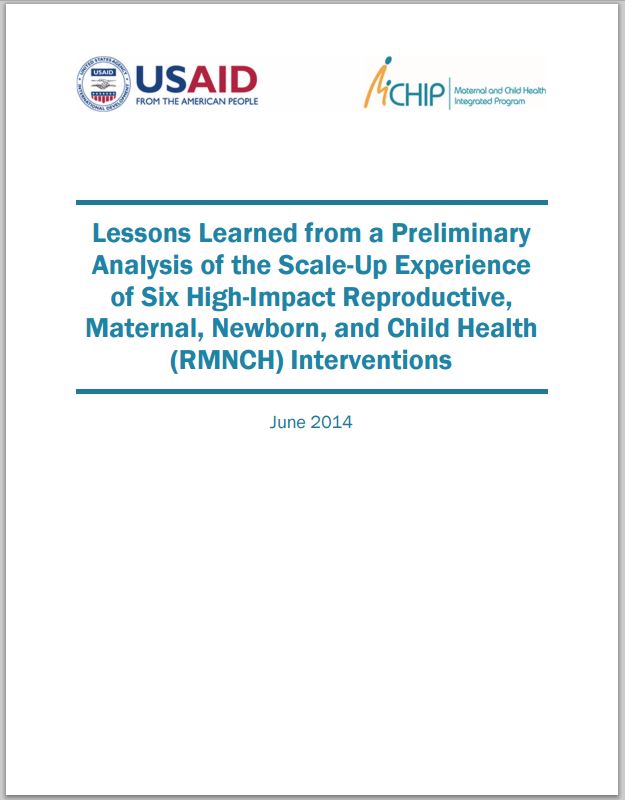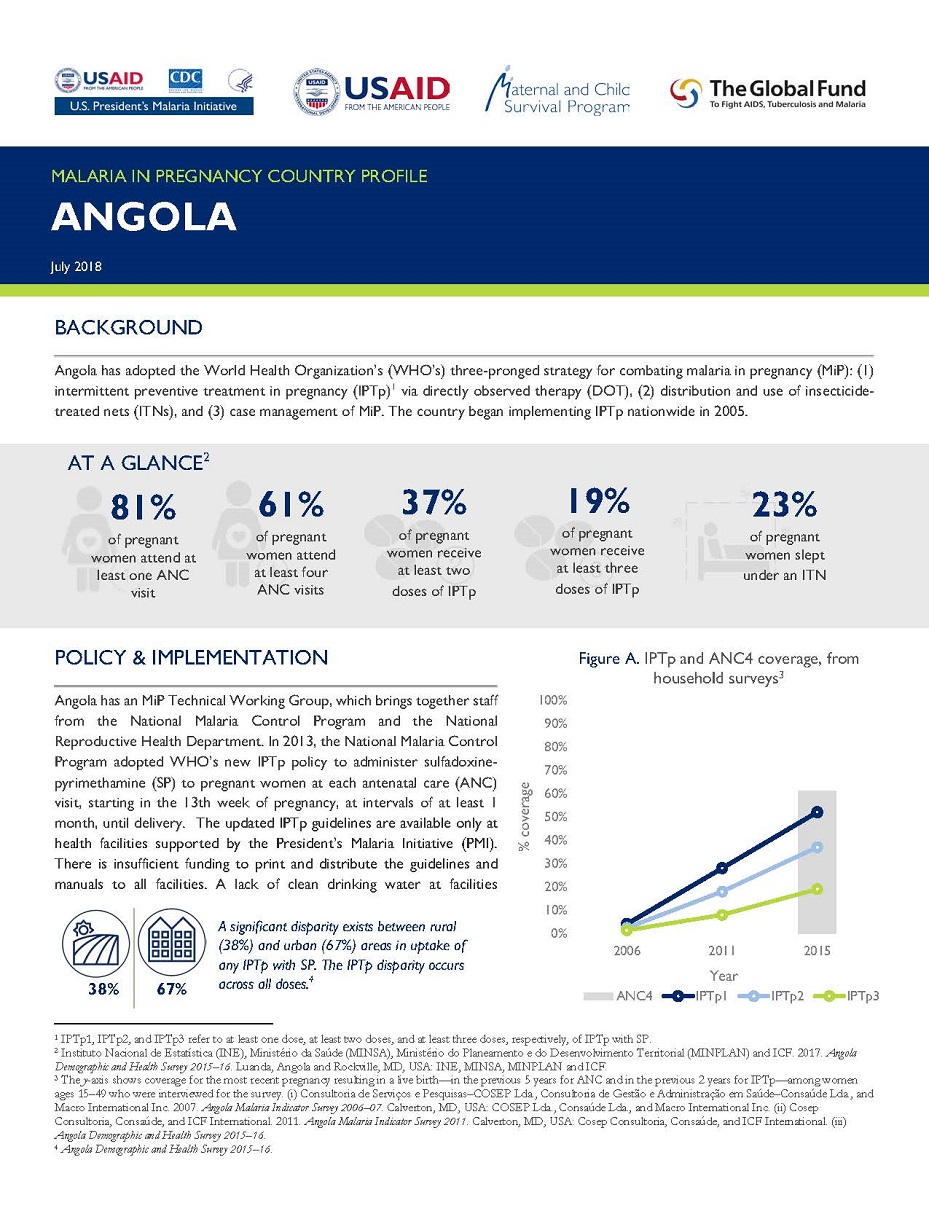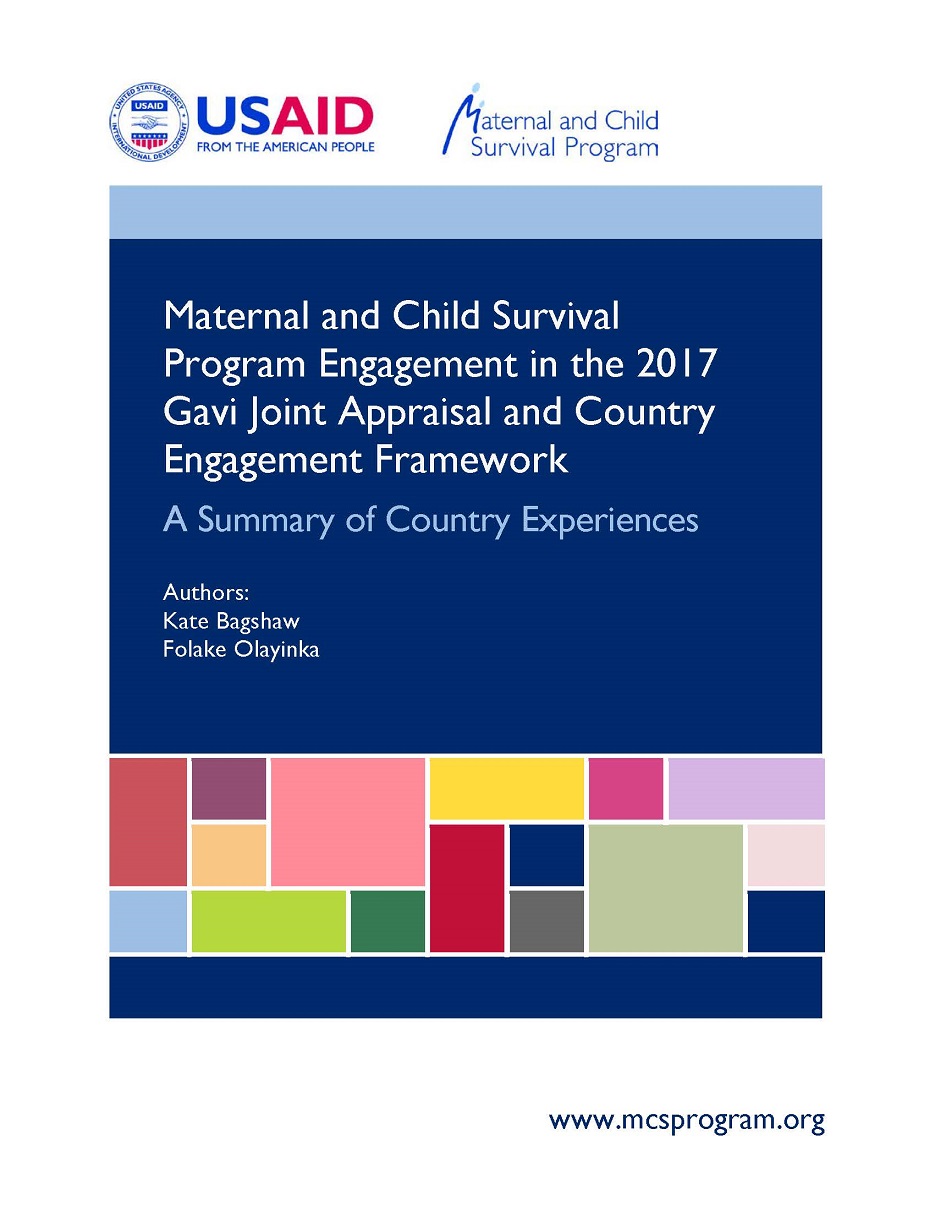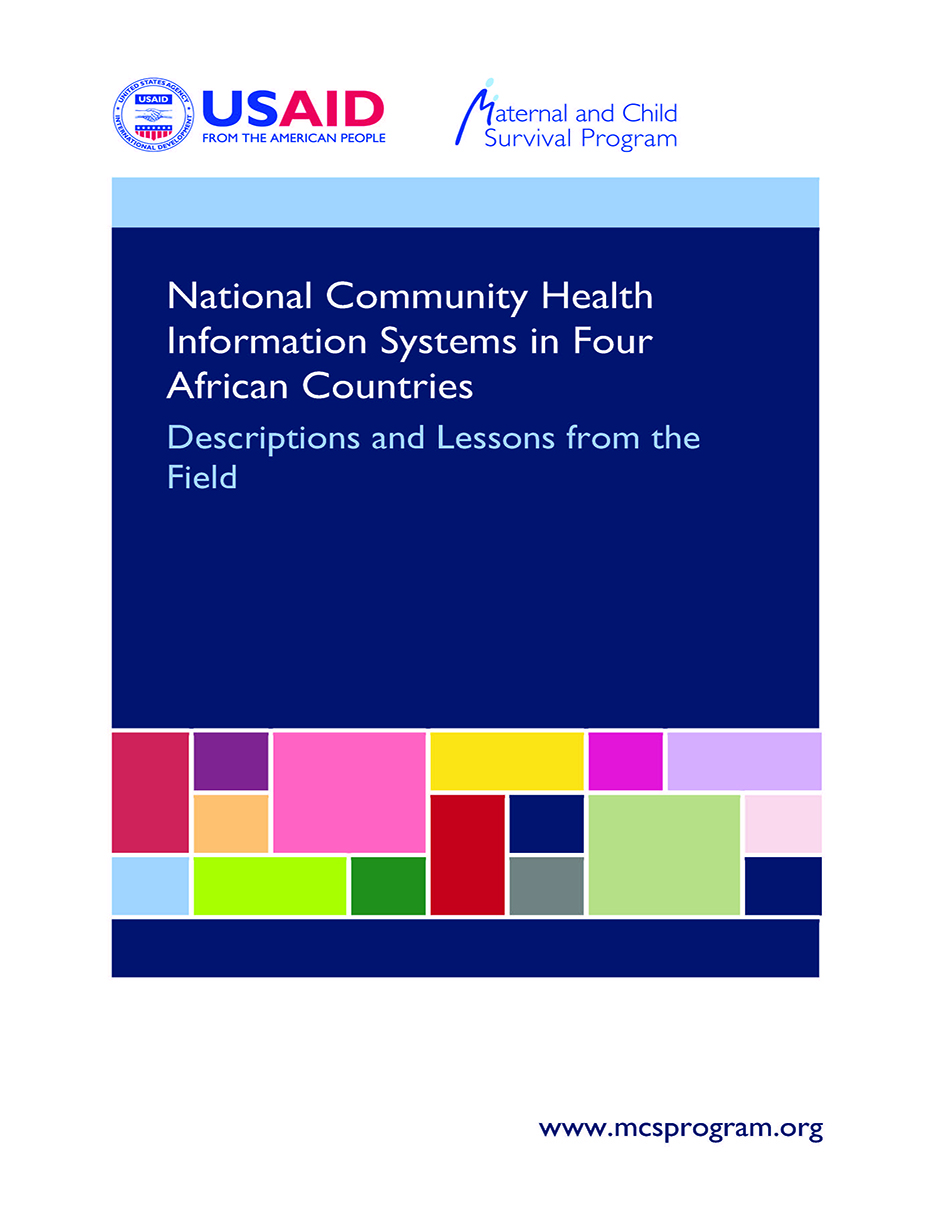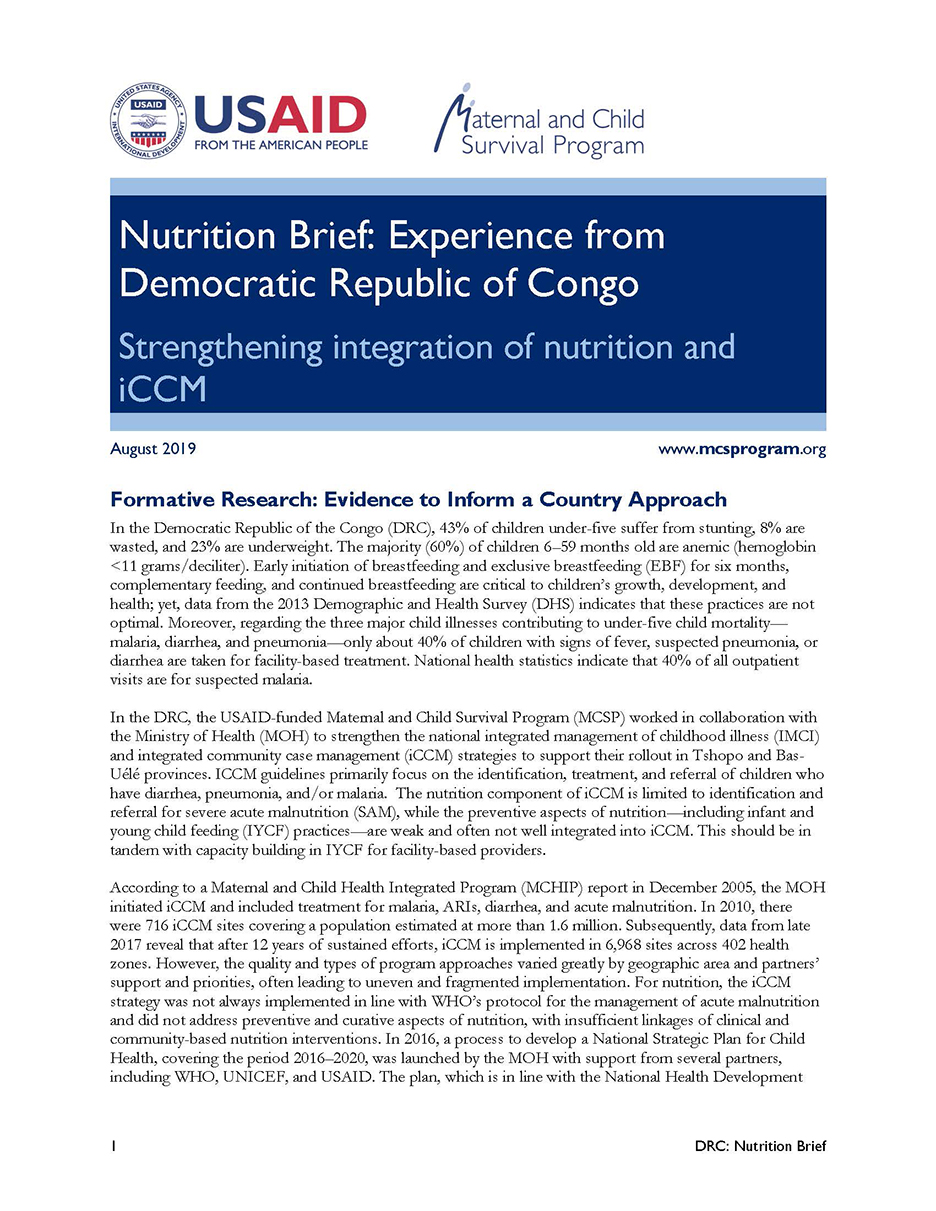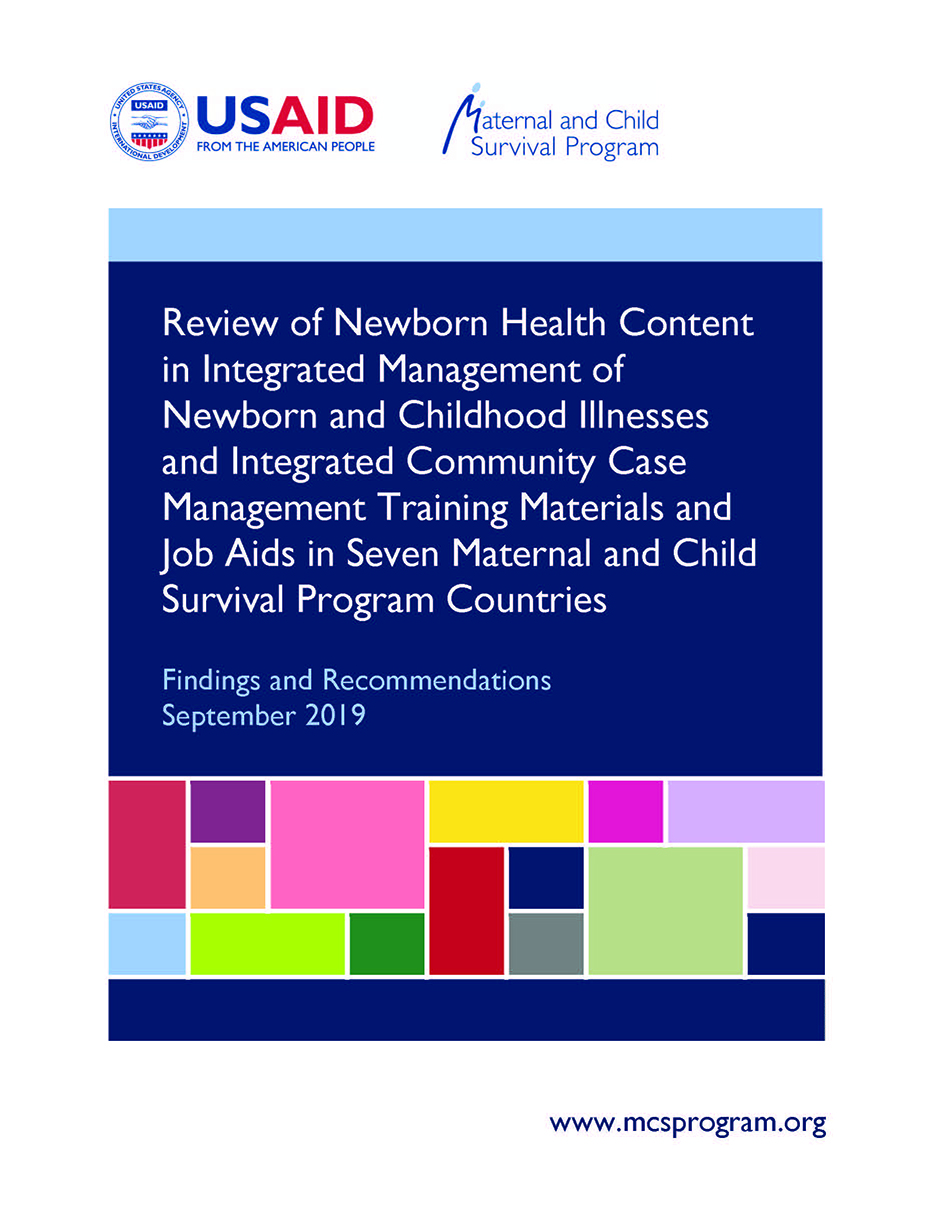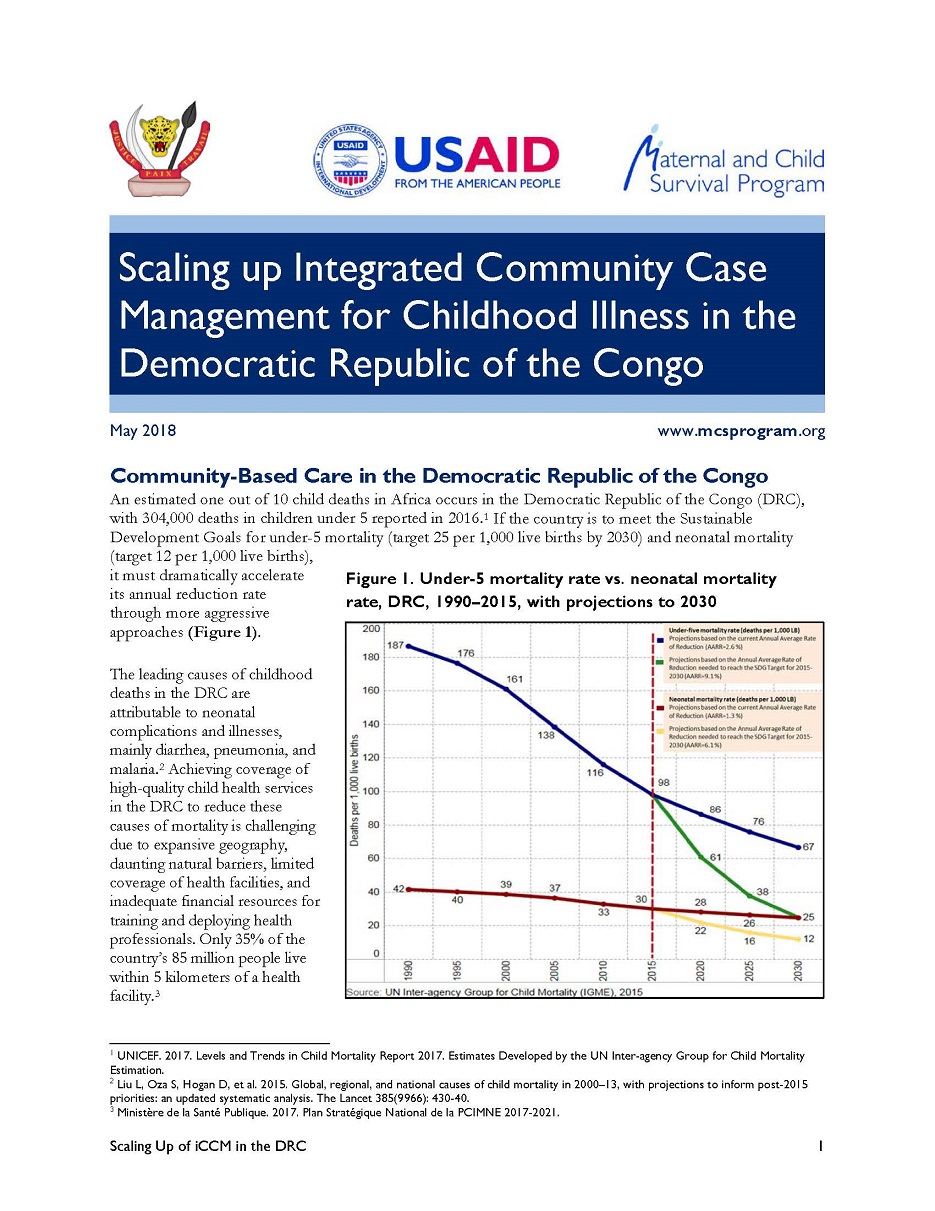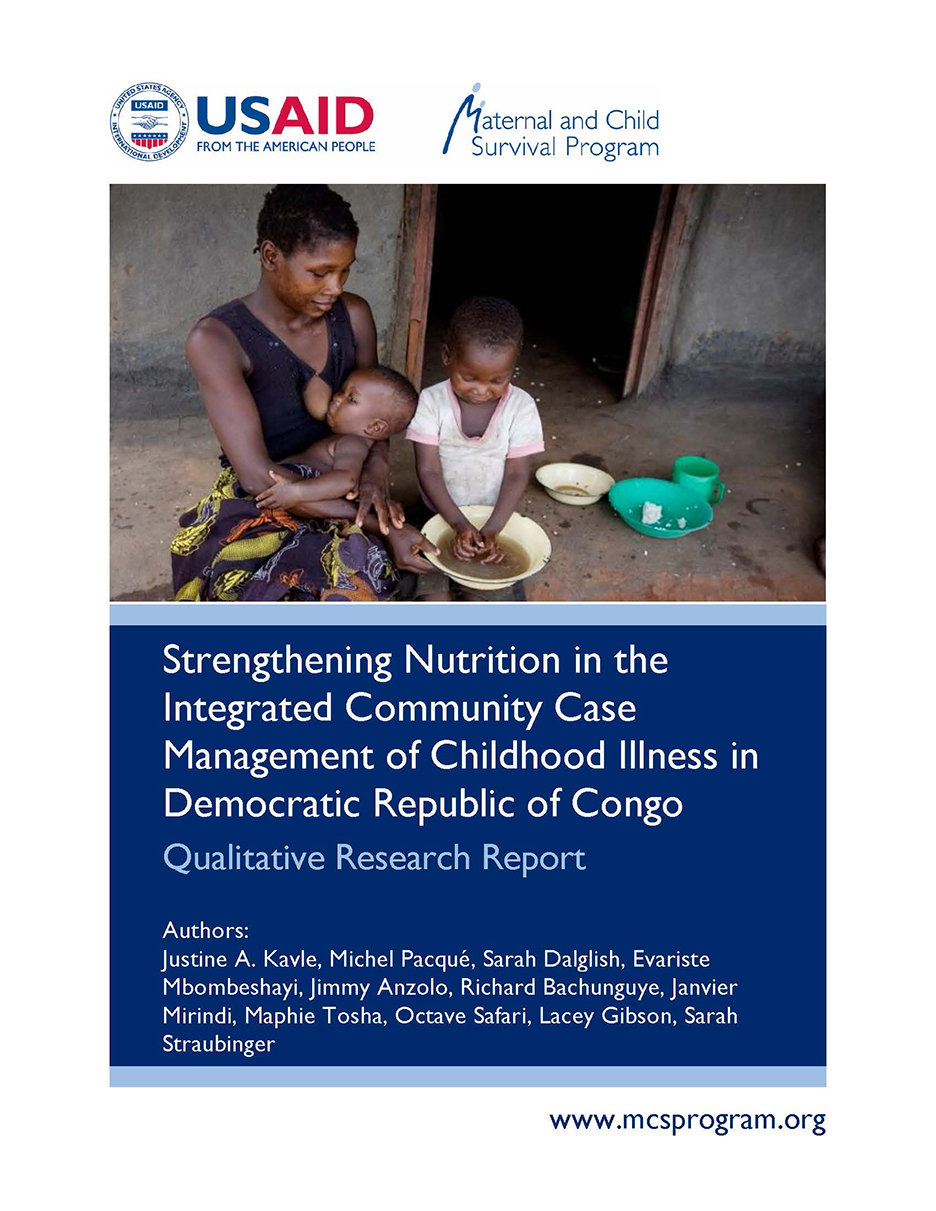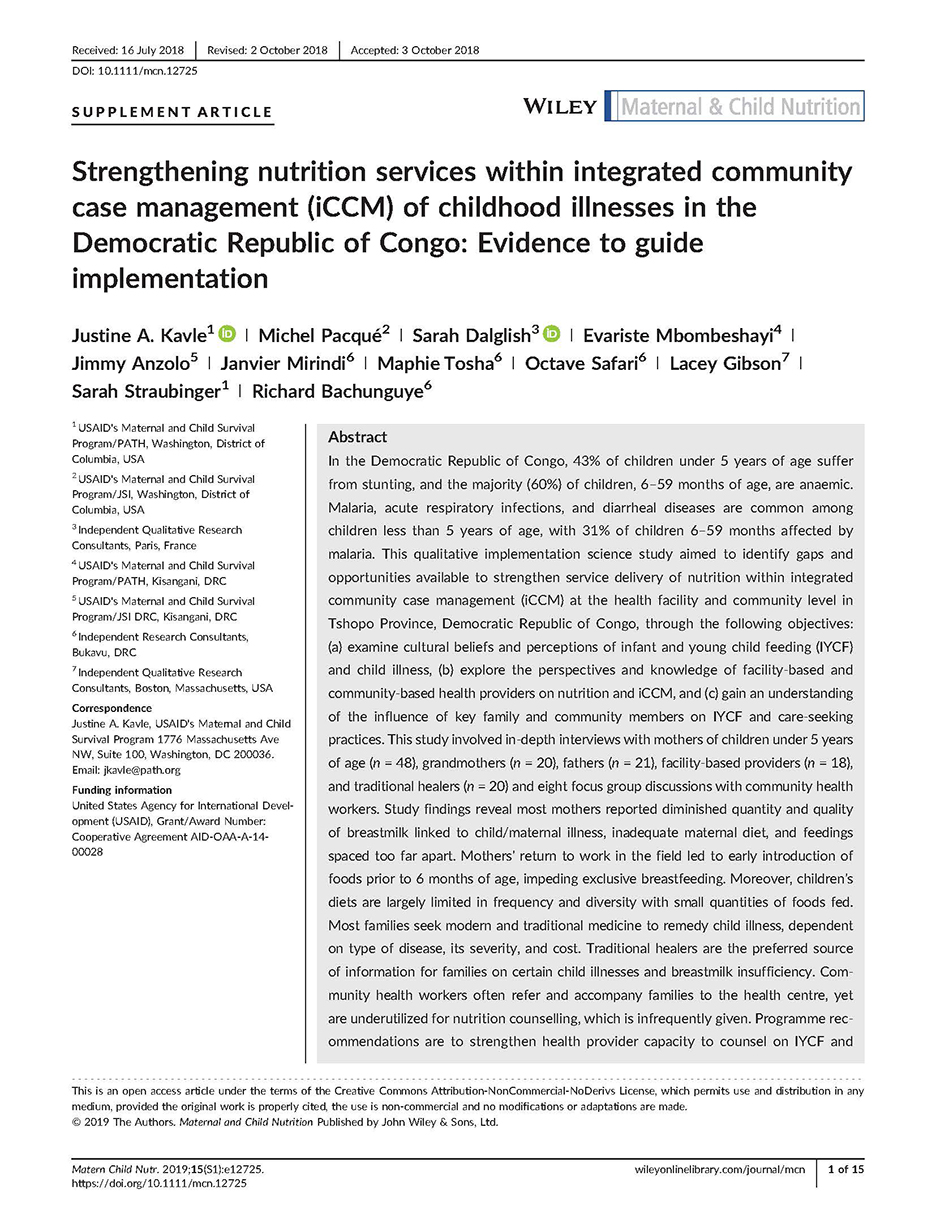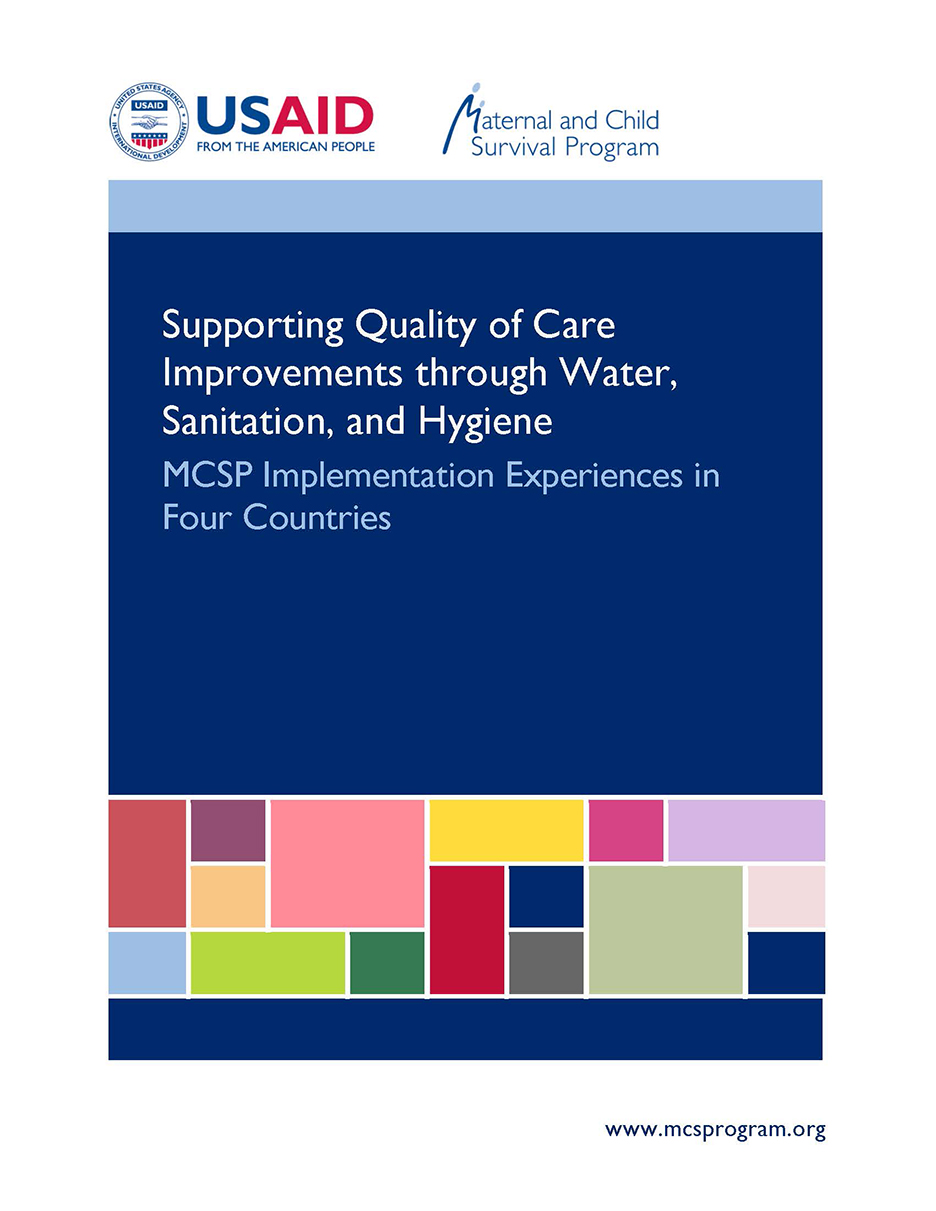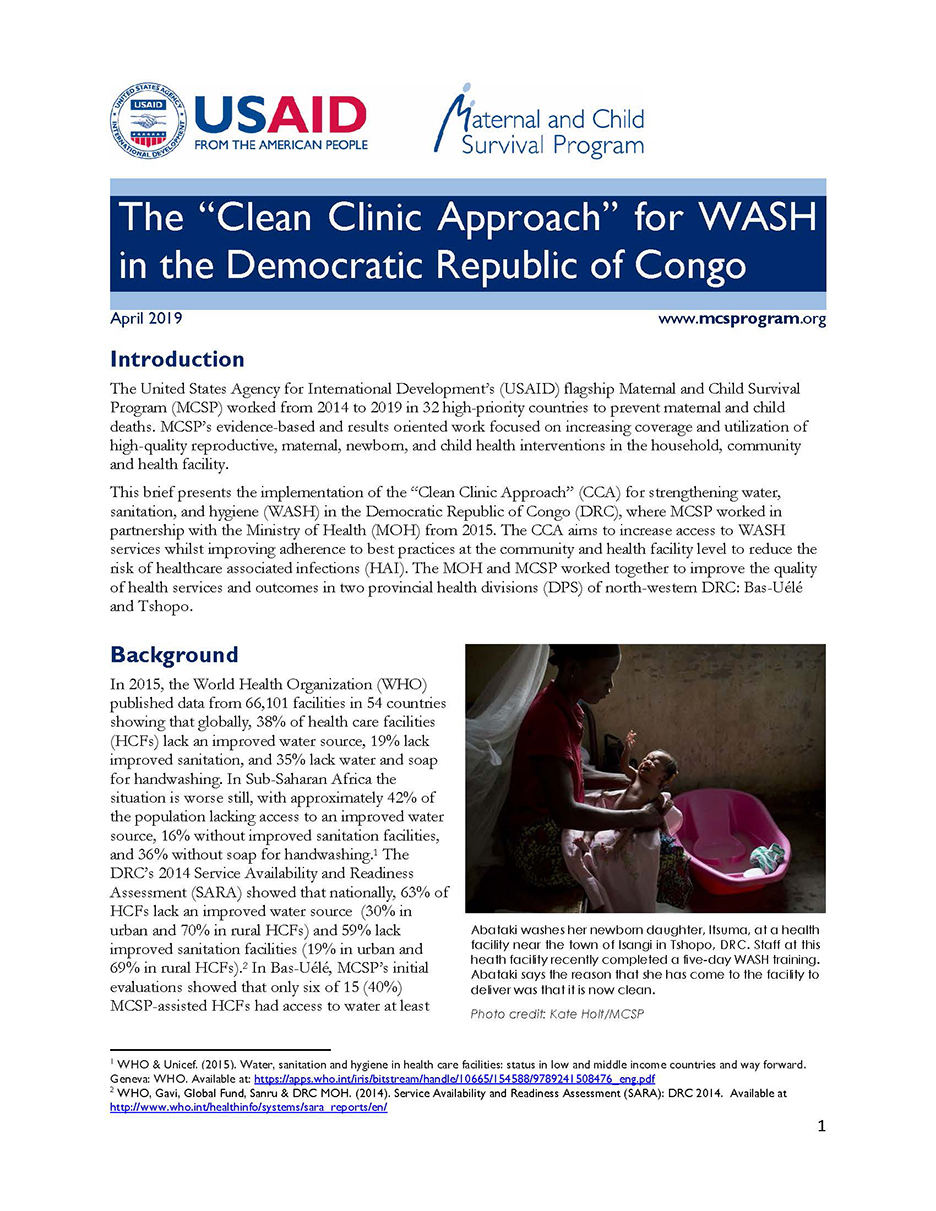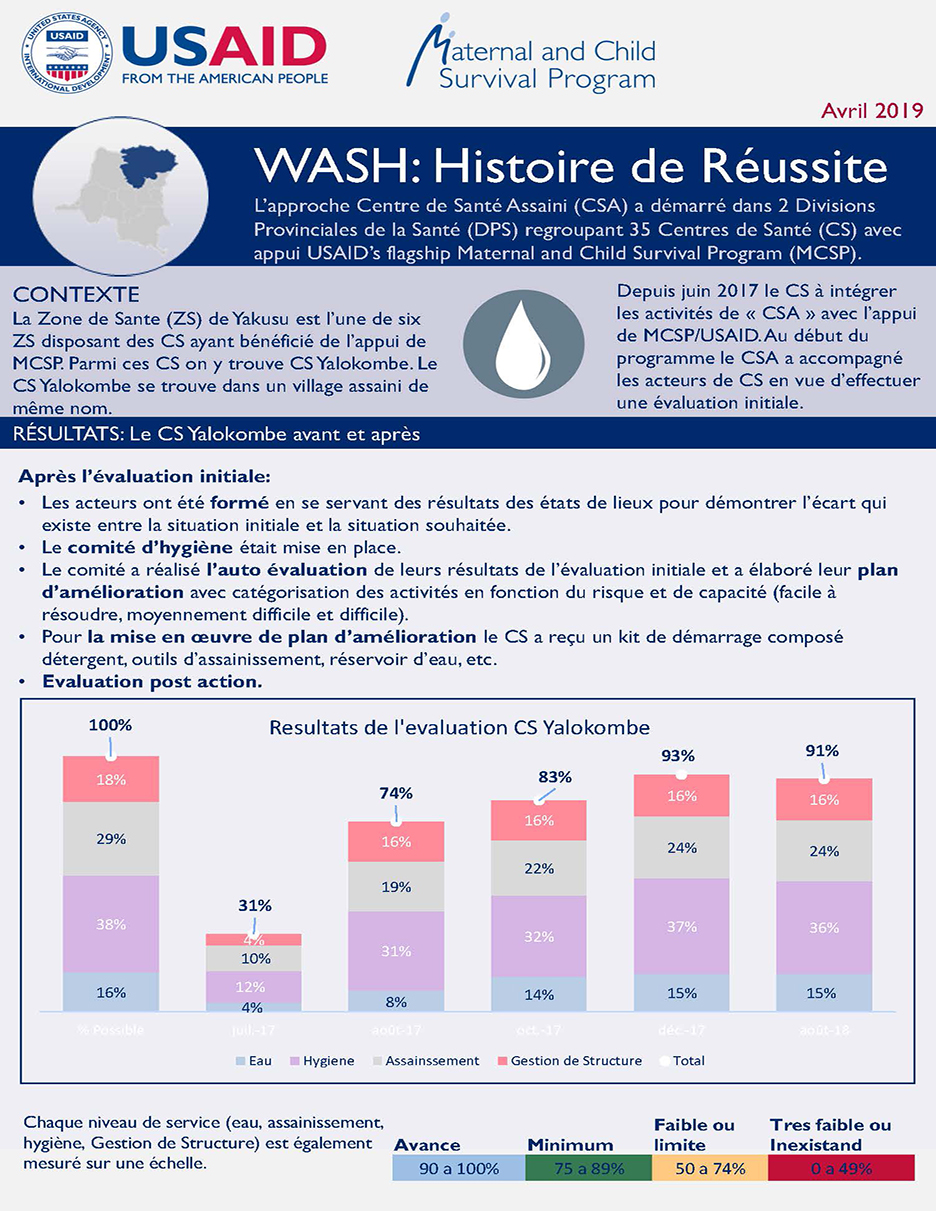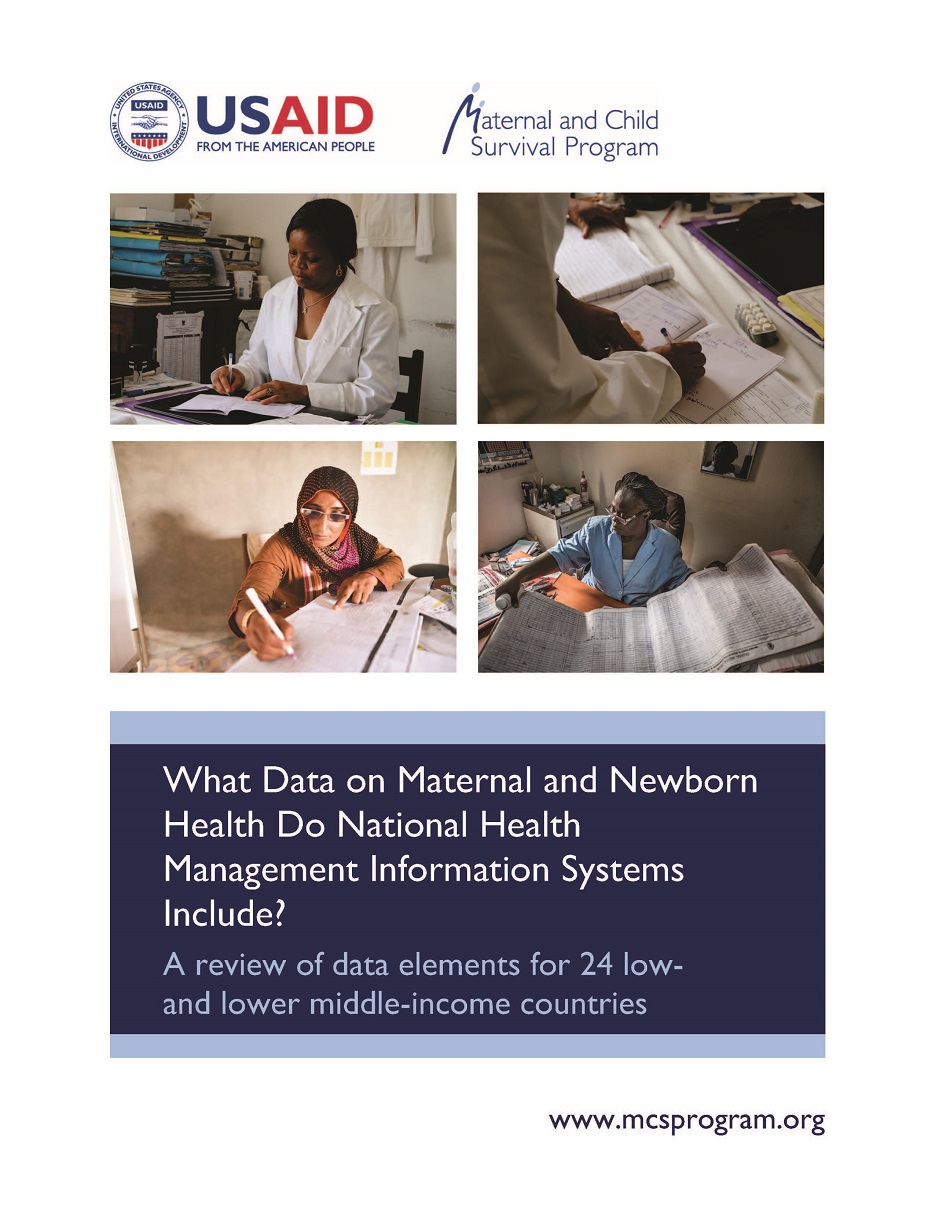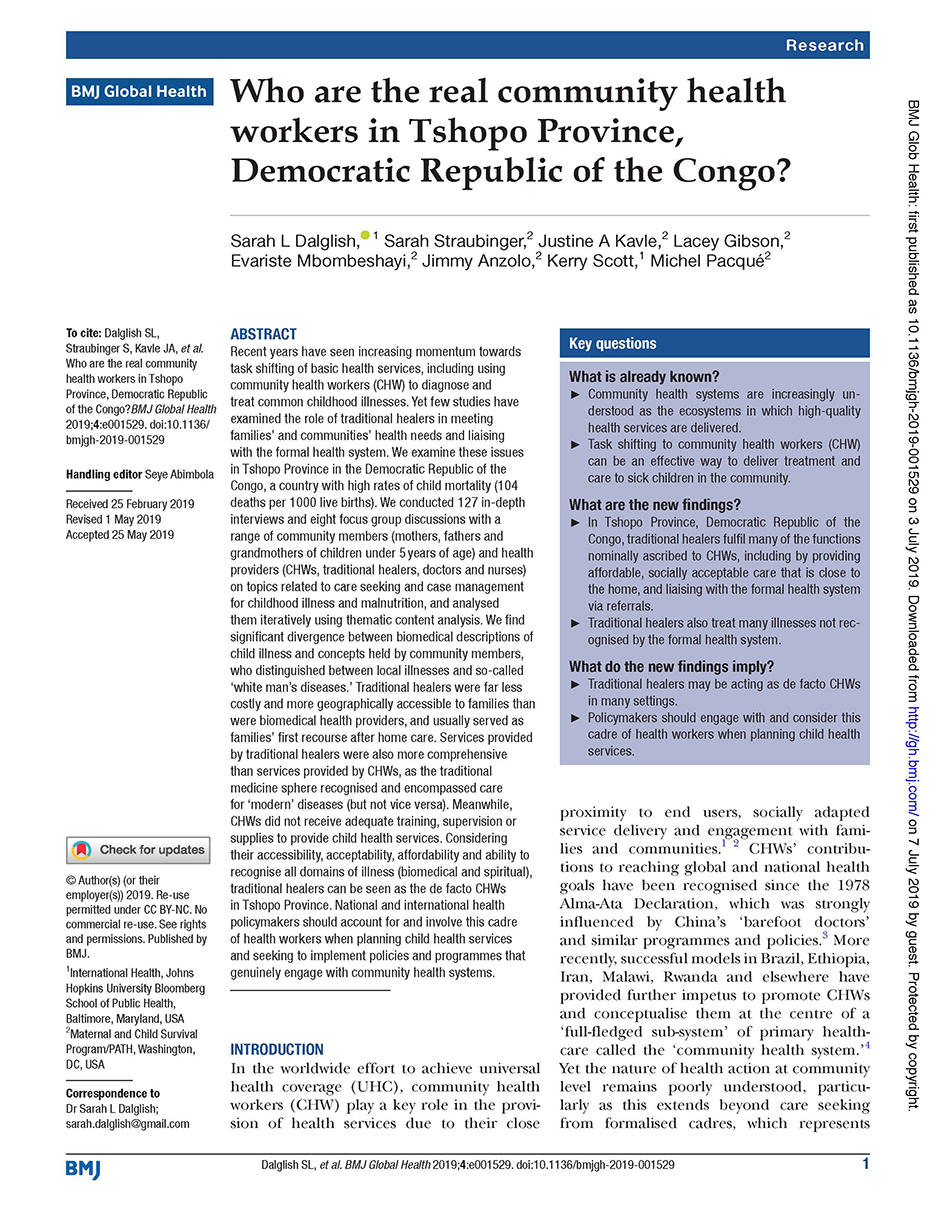22 Resources Found
Africa Regional Workshop on Improving Routine Data for Child Health in National Health Information Systems
This workshop report covers the highlights of the September 2017 Africa Regional Workshop on Improving Routine Data for Child Health in National Health Information Systems. The workshop aimed to advance the availability, accessibility, quality, and use of child health and nutrition data within national health information systems. More than 90 participants from 15 countries gathered […]
Building Family Planning Services in DRC
In the Democratic Republic of Congo (DRC) an estimated 70% of the population of 81 million have little or no access to healthcare. DRC has the third highest fertility rate globally at 6.6 children per woman, a national maternal mortality rate of 846 per 100,000 live births and an adolescent birth rate of 138 per […]
Democratic Republic of Congo Strengthening MOH Institutional Capacity
MCSP partnered with the Democratic Republic of Congo’s Ministry of Public Health (MOH) from 2015 to early 2019 to accelerate reductions in maternal and child mortality. Strengthening the Ministry’s institutional capacity to strategically scale up cost-effective, high-impact, evidence-based interventions was among MCSP’s primary objectives at the national level. To do this, MCSP DRC worked with […]
Financial Analysis to Inform the Scale-up and Sustainability of Reproductive, Maternal, Neonatal, and Child Health Interventions and Services
This document synthesizes MCSP’s efforts to strengthen health systems by analyzing scale-up costs and financial flows for RMNCH services. It includes MCSP’s approach to financial analysis for scale-up and findings from analyses conducted in the Democratic Republic of the Congo (DRC), Ghana, Nigeria, Rwanda, and Uganda. This brief also presents lessons learned to improve future […]
Increased Use of Child Health Services in Bas-Uele and Tshopo Provinces in DRC
MCSP supported the DPS of Bas-Uele and Tshopo to introduce an integrated package of services for sick children in 119 community care sites and 106 health centers. This two-page graphic is also available in French. […]
Kangaroo mother care: a multi-country analysis of health system bottlenecks and potential solutions
This MCSP co-authored article published in the journal BMC Pregnancy & Childbirth aims to: 1) use a 12-country analysis to explore health system bottlenecks affecting the scale-up of kangaroo mother care; (2) propose solutions to the most significant bottlenecks; and (3) outline priority actions for scale-up. The 12 countries reviewed in the article are: Cameroon, […]
Kintambo Model Training Center
One of MCSP’s three objectives in DR Congo was to improve maternal and newborn survival through the provision of quality in-service training and pre-service education on key maternal and newborn health and postpartum family planning (PPFP) interventions. The Program’s approach to human capacity development focused on developing individual health worker knowledge and skills through experience […]
L’approche centre de santé assaini pour l’eau, l’assainissement et l’hygiène (EAH) en République Démocratique du Congo (DRC)
Ce document explique la mise en oeuvre de l’approche « centre de santé assaini » (CSA) pour renforcer les services d’eau, d’assainissement et d’hygiène en DRC, où MCSP a travaillé en collaboration avec le Ministère de la Santé (MSP) depuis 2015. Le CSA vise à renforcer l’accès aux services EAH tout en améliorant l’adhésion aux […]
Lessons Learned from the Scale-Up Experience of Six High-Impact Interventions in Reproductive, Maternal, Newborn, and Child Health
USAID’s predecessor flagship Maternal and Child Health Integrated Program (MCHIP) worked in more than 50 developing countries in Africa, Asia, Latin America, and the Caribbean to assist in the scale up of high impact interventions in reproductive, maternal, newborn, and child health (RMNCH). This brief summarizes the results of the Program’s scale up experience and […]
Malaria in Pregnancy Country Profiles
This series of 12 malaria in pregnancy (MiP) country profiles illuminates the current status of MiP programming in US President’s Malaria Initiative (PMI) countries with a focus on the progress achieved in ensuring intermittent preventive treatment of malaria in pregnancy (IPTp) coverage among pregnant women. The profiles explore progress toward attaining targets, updates to countries’ […]
Maternal and Child Survival Program Engagement in the 2017 Gavi Joint Appraisal and Country Engagement Framework: A Summary of Country Experiences
To assess the implementation progress and performance of Gavi’s support for new and underutilized vaccines and health system strengthening efforts, as well as its contribution to improved immunization coverage and equity, Gavi countries engage in regular review processes — either joint appraisals (JAs) or country engagement framework (CEF) reviews. This report provides an overview of […]
National Community Health Information Systems in Four African Countries
Using a case study approach, this report describes the design and operations of national Community Health Information Systems (CHIS) in four African countries with the overall goal of informing global and national-level community programming and CHIS stakeholders about CHIS design and functioning in countries and the lessons learned across them. This technical report has three […]
Nutrition Brief: Experience from Democratic Republic of Congo
MCSP, in partnership with stakeholders, undertook a formative study to develop an approach to strengthen nutrition integration within integrated community case management (iCCM) in three MCSP-supported health zones including Yaleko, Yakusu, and Isangi. […]
Review of Newborn Health Content in Integrated Management of Newborn and Childhood Illnesses and Integrated Community Case Management Training Materials and Job Aids in Seven Maternal and Child Survival Program Countries
This assessment was designed to understand the newborn care content in country materials for Integrated Management of Newborn and Childhood Illness and integrated community case management. Specifically the assessment focuses on content related to essential newborn care, postnatal care, care for low-birthweight and preterm babies, breastfeeding and support to mothers for breast milk feeding, management […]
Scaling up Integrated Community Case Management for Childhood Illness in the Democratic Republic of the Congo
The leading causes of childhood deaths in the the Democratic Republic of the Congo are attributable to neonatal complications and illnesses — mainly diarrhea, pneumonia and malaria. This brief highlights the benefits of getting services closer to remote communities, and larger efforts to scale up integrated community case management for childhood illness to reduce the country’s child […]
Strengthening Nutrition in the Integrated Community Case Management of Childhood Illness in Democratic Republic of Congo
In the Democratic Republic of Congo, MCSP is working in collaboration with the Ministry of Public Health (MOPH) to strengthen the national integrated management of childhood illness (IMCI) and integrated community case management (iCCM) strategies, and supporting their rollout in Tshopo and Bas-Uélé provinces. Part of the IMCI strategy includes assessing the nutritional status of […]
Strengthening Nutrition Services within Integrated Community Case Management of Childhood Illnesses in the Democratic Republic of Congo: Evidence to Guide Implementation
This qualitative implementation science study aimed to identify gaps and opportunities available to strengthen service delivery of nutrition within integrated community case management (iCCM) at the health facility and community level in Tshopo Province, based on findings on the cultural beliefs, perceptions, and knowledge guiding infant and young child feeding (IYCF) and child illness, and […]
Supporting Quality of Care Improvements through Water, Sanitation, and Hygiene
MCSP worked to improve health care facility WASH conditions and practices to contribute to quality of care (QoC) improvements and reductions of maternal and newborn infections through MCSP’s innovative Clean Clinic Approach. This report highlights experiences from four MCSP country programs (Haiti, Democratic Republic of the Congo, Guatemala, and Nigeria) that used WASH investments as […]
The “Clean Clinic Approach” for WASH in the Democratic Republic of Congo
This brief presents the implementation of the “Clean Clinic Approach” (CCA) for strengthening water, sanitation, and hygiene (WASH) in the Democratic Republic of Congo (DRC), where MCSP worked in partnership with the Ministry of Health (MOH) from 2015. The CCA aims to increase access to WASH services whilst improving adherence to best practices at the […]
WASH: Histoire de Réussite
This infographic provides a brief overview of the Clean Clinic Approach program MCSP DRC implemented in 35 health clinics in 2 provinces and initial results achieved. […]
What Data on Maternal and Newborn Health Do National Health Management Information Systems Include?
This report reviews the data elements related to maternal and newborn health (MNH) present in the health management and information (HMIS) systems in 24 low- and lower middle-income countries. The review’s purpose is to quantify the extent to which key data elements are available in the antenatal, delivery and postpartum registers and associated summary reporting […]
Who are the Real Community Health Workers in Tshopo Province, Democratic Republic of the Congo?
Recent years have seen increasing momentum towards task shifting of basic health services, including using community health workers (CHW) to diagnose and treat common childhood illnesses. Yet few studies have examined the role of traditional healers in meeting families’ and communities’ health needs and liaising with the formal health system. We examine these issues in […]

